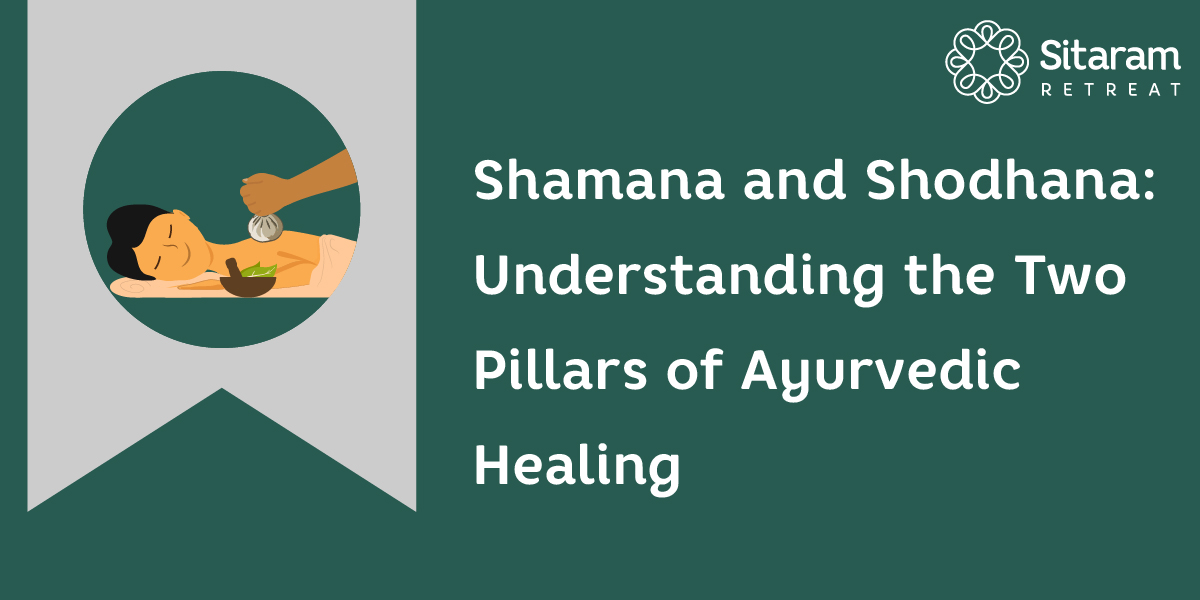Stay Healthy During Rainy – Varsha Ritu Charya
By Vignesh Devraj

Rain is a spell that transforms nature. The rainy season is a dissent to the arrogant summer, as it brings back the energy and comfort we lost to the latter. Cozy temperature, trees tearing up, raindrops rhythmically pounding over the windowpane, and maybe a dash of lightning. Undoubtedly, monsoon is whole another mood. And the best part is, you could also use it as an excuse to nestle up on the bed the whole day! Every good thing comes with a price to pay- for the rainy season, it is your health. From a not-so-problematic running nose to troublesome infectious diseases, the season can cause a lot of mess. Maybe this is the best time to revisit your health routines, take some precautions, and make your body rain-ready. So pluviophiles and pluviophobes, gather here and read on!
Ayurveda and Seasons
Ayurveda describes 6 seasons with respect to the Indian climate, each of them known as ritu. Sisira (late winter), Vasantha (spring), Greeshma (summer), Varsha (monsoon), Sarath (autumn), and Hemanta (early winter) are the ritus. The first three falls under the category Aadan kaala/Uttarayana (Northern solstice) where the sun travels north of the Earth, and the next three belong to the Visarga kaala/Dakshinayana (Southern solstice) where the sun moves southwards. While aadaan kaala takes up the energy through strong sunlight and winds, visarga kaala provides it with comforting temperature levels and the power of the moon. Every aspect of life is influenced by the seasons, and so is your health.
The three doshas
According to Ayurveda, our body has three invisible bioenergies, and we call them doshas in general. They are vata, pitta, and kapha. Each of these doshas has specific functions, and the fine balance between them is what we call health. This equilibrium is determined by a lot of factors- what we eat, what we drink, what our mood is, what our habits are, etc. Each one of these doshas is important and carries out different bodily activities. For example, Vata is the mobilizer among the three and is thought to be in control of neuronal impulses, locomotor system, respiration, and apparently anything that requires movements. Pitta is the invisible molten fire and controls digestion, temperature, complexion, temperament, courage, enzymatic activities, etc. Similarly, kapha is the sluggish but nourishing one and gives the body stability, lubrication, and nutrition. But sometimes, these doshas can be vengeful- they can transform into Macbeth’s witches who don’t play by a rulebook, and there is no easy way to tame them if unleashed.
Varsha ritu and doshas
While monsoon seems so peachy and peaceful from the outside, your body might have a different story to tell. Our internal environment changes according to the transitions happening in the exterior, and Ayurveda addresses this as the mischief of the three doshas. Varsha ritu is the festive season for Vata, the dosha with wheels. Imagine vata as the wind- dry, light, and rough. The summer can accentuate these qualities of vata and let them accumulate. By the time the rainy season comes, the vata dosha could be blown out of proportion, and that is why Varsha ritu is said to be the aggravator of vata. So, getting excess vata out of the system and restoring the dosha balance is the key to good health.
To eat or not to eat?
For most of us, rain is a good reason to curl up on the couch with a couple of eatables, especially junk foods. Isn’t it almost impossible to resist the seducing looks of a bowl of Maggi or some fritters while it is raining? This is exactly another reason for your vata surge- the fried foods. It can lead to unhealthy weight gain too. In Varsha ritu, your digestive fire (Agni) is already at stake due to the action of pitta, so munching on dry, spicy, and light snacks increases vata. And so does the cold and chilled food. The dietary rules for Varsha ritu can be summarised as follows:-
- Prefer steamed foods instead of fried/deep-fried stuff
- Eat fresh foods and avoid the refrigerated ones
- Eat light
- Eatables prepared from paddy, barley, and wheat can be included in the diet
- To increase the digestive fire, consume a chunk of ginger with salt, preferably saindhava, the rock salt
- Consume seasonal vegetables and fruits
- Include cow’s ghee in the diet
- Fluid intake is necessary. Monsoon is not the excuse to chuck daily water requirements, because of increased elimination through urine. Have lukewarm, boiled, and cooled water. Adding a little honey to it will be healthy
- Vegetable soups are a good option- light, hot, and easy to digest
- Leafy vegetables can be vata aggravating and have to be avoided during the rainy season
- Limit or avoid meat consumption, especially red meat which takes more time to digest. If you feel like having it, they can be made into curry instead of frying it
- Warm foods are to be encouraged
- Avoid curd. Use buttermilk instead
- Undercooked and uncooked foods like salads are not to be entertained
- Completely avoid cold, chilled, and fizzy drinks. Lukewarm and hot beverages like herbal tea are preferred
- As the digestive fire is weak, consider adding ginger, asafoetida, pepper, and other digestion-promoting herbs to the daily diet
- Prefer sweet, salty, and sour food items.
Life hacks for rainy days
Your day-to-day habits dictate who you are as a person. The body has to be supported not only through a healthy diet but a healthy lifestyle too. Ayurveda believes in smart work when it comes to seasonal regimens- that is, changing habits according to the doshik changes in each season rather than following some peer-recommended daily routine. This is called ritucharya. Sticking to proper ritucharya can yield long-term benefits. Ancient Ayurvedic scholars like Vagbhata have stressed the importance of having a healthy seasonal regimen in their textbooks. Following ritucharya can not only balance the doshas but also prevent the diseases the dosha vitiation can cause. So consider it a precautionary measure, because this could be an answer to lifestyle disorders!
The following are the do’s and don’ts of Varsha ritucharya:-
- Do not indulge in excess exercises as it will increase vata. Mild stretching exercises can be practiced
- Avoid day sleep as it can slow down metabolism
- Better stay away from air-conditioners and damp things
- Keep yourself clean and dry
- Put on footwear while walking
- Sexual intercourse should be limited as it can trigger vata
- Dhoopana (fumigation) can protect you from vector-borne diseases. It is an Ayurvedic mode of disinfection. Dhooma choornas like Aparajita dhooma choorna are available in the market
- This is the best season for Panchakarma therapies and rejuvenation therapies
- Abhyanga (oil massage) followed by a bath in lukewarm water is entertained.
Seasons are nature’s filters. They are beautiful and we need to learn to enjoy them to the fullest. To bask in the charm of ritus, one has to have a healthy body and mind. Sitaram Ayurvedic Retreat could be your guide for attaining the same. Located near Snehatheeram beach, Thrissur, Sitaram Retreat is an Ayurvedic destination where healing meets quality. If you want a comfortable place where you can unburden yourself and connect with your inner spirit, this is it. Come, feel at home.


 retreat@sitaramayurveda.com
retreat@sitaramayurveda.com +91 813 8888 912
+91 813 8888 912





